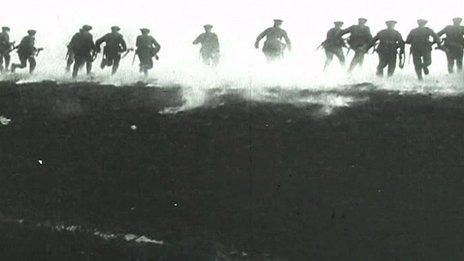World War One: Belfast soldiers' letters inspire short film
- Published
World War One researcher Jason Burke reads from letters written at the Western Front by soldiers from east Belfast in 1918, in an extract from a new documentary.
World War letters written by 10 young soldiers from Belfast as they served on the Western Front in early 1918 have inspired a new short film.
The soldiers were all members of the Church of Ireland parish of St Mark's, Dundela, in the east of the city.
The notes contain the troops' messages of thanks for Christmas parcels sent to the trenches by people of the parish.
The letters were discovered almost a century later in a former bishop's residence in the Republic of Ireland.
The documents give a personal insight into trench warfare, as the soldiers battled against the cold, the mud and separation from their families back in Belfast.
The Church of Ireland has commissioned a new documentary, The Boys from East Belfast, which details the attempts to find out more about the men who wrote the letters.
The correspondence was addressed to the soldiers' former parish rector, Dr Arthur Barton, who later went on to become Archbishop of Dublin.
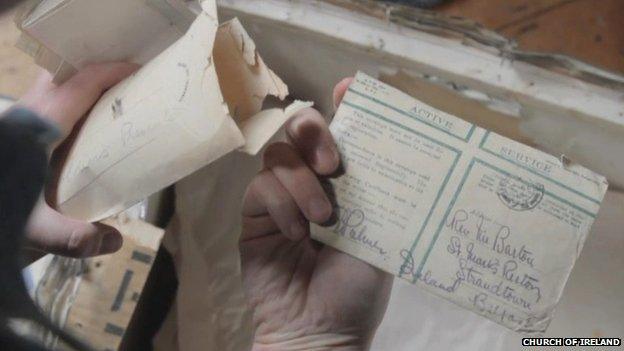
The letters were discovered inside a tea chest in the basement of an Irish bishop's house about two years ago
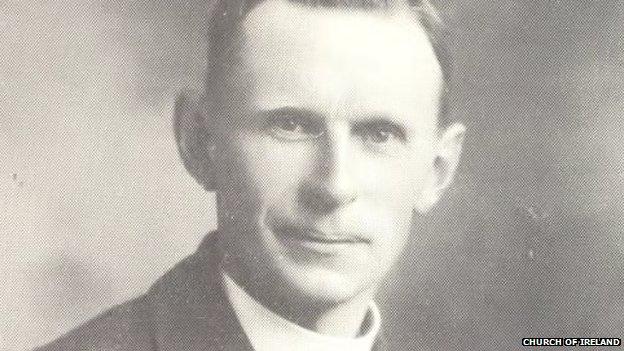
The letters were kept safe by Dr Arthur Barton, rector of St Mark's parish during WW1
They were found about two years ago, in the basement of Kilmore See House, County Cavan, where Dr Barton lived during his tenure as Bishop of Kilmore.
The discovery was made by Church of Ireland archivist, Dr Susan Hood, as she helped to clear the property before it was put on the market.
"The role of the archivist is to keep records safe," Dr Hood told BBC Radio Ulster.
"There was a lot of material, but I do remember on particular tea chest in the basement, removing stuff from it and wondering why there was a lot about Belfast in it."
Dr Hood took the letters back to the Representative Church Body (RCB) library in Dublin, and found out that Dr Barton had been appointed rector at St Mark's, Dundela in 1914, the year the war began.
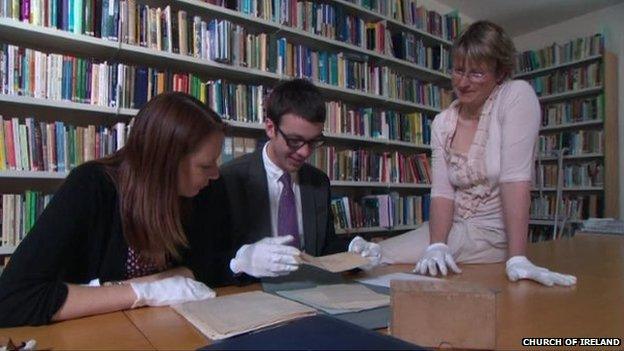
Researcher Jason Burke and archivist Dr Susan Hood (right) have tried to find out what happened to the soldiers who wrote home in 1918
She said the letters showed the soldiers were thinking about their families back in Belfast, and hopes of getting back to Dundela were "keeping them going".
"We learn from them conditions are awful, the weather is bad, the guys are really reflecting on what they're going through, so we get a sense about the war," Dr Hood said.
"We also get a sense about what is going on at home, and in this way Barton is a very special link for them, because some of them are thanking him for looking after their wives and their families, in a pastoral sense."
The "comfort parcels" contained items such as socks and mittens, and took several weeks to reach the troops on the Western Front.
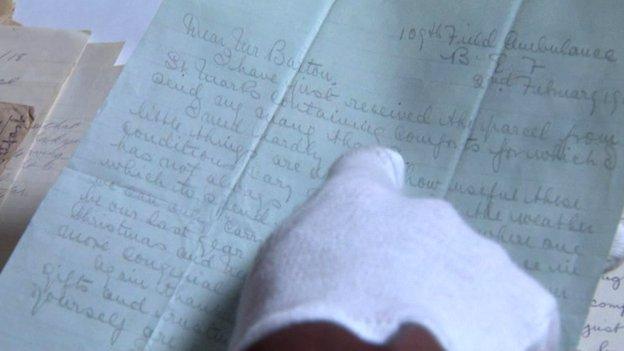
The soldiers were writing home to express their gratitude to the people of their parish, who sent Christmas parcels to the troops in the trenches
It is believed that all 10 soldiers survived the war, and documentary features research carried out by Jason Burke, from the Great War Project East Belfast, who tried to find out what happened to them when they came home.
"For me, the interesting thing about the Great War is about the men themselves, and their social backgrounds, rather than military history," Mr Burke told BBC Radio Ulster.
"We've unearthed some interesting things about one or two of the men who were involved in these letters."
Mr Burke found out that although Royal Irish Rifles soldier William John Sterrett survived World War One, he was later listed as a civilian casualty of World War Two.
Mr Sterrett served as a sergeant with the Home Guard during the Second World War, but was killed during the Belfast Blitz in May, 1941.
"The Germans eventually caught up with him," Mr Burke said.
"He came through The Battle of Cambrai, where 95,000 people perished, and then sadly dies on his own doorstep."
The film was shown to the public at St Mark's church, Dundela, on Monday night, where the letters have been put on display for remembrance week.
From 11 November, the documentary will be available to view on the Church of Ireland website, external.
- Published27 December 2012
